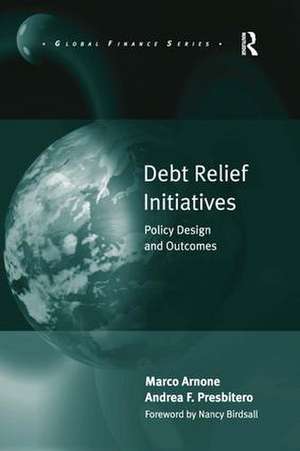Debt Relief Initiatives: Policy Design and Outcomes: Global Finance
Autor Marco Arnone, Andrea F. Presbiteroen Limba Engleză Hardback – 29 noi 2010
Din seria Global Finance
-
 Preț: 416.22 lei
Preț: 416.22 lei - 17%
 Preț: 184.81 lei
Preț: 184.81 lei - 25%
 Preț: 501.57 lei
Preț: 501.57 lei - 25%
 Preț: 503.19 lei
Preț: 503.19 lei - 18%
 Preț: 1000.27 lei
Preț: 1000.27 lei -
 Preț: 393.52 lei
Preț: 393.52 lei - 15%
 Preț: 470.31 lei
Preț: 470.31 lei - 18%
 Preț: 1005.80 lei
Preț: 1005.80 lei - 18%
 Preț: 1000.27 lei
Preț: 1000.27 lei - 18%
 Preț: 1000.27 lei
Preț: 1000.27 lei -
 Preț: 323.23 lei
Preț: 323.23 lei -
 Preț: 469.34 lei
Preț: 469.34 lei - 18%
 Preț: 1011.99 lei
Preț: 1011.99 lei - 26%
 Preț: 764.20 lei
Preț: 764.20 lei - 17%
 Preț: 259.33 lei
Preț: 259.33 lei
Preț: 769.00 lei
Preț vechi: 1030.23 lei
-25% Nou
Puncte Express: 1154
Preț estimativ în valută:
147.14€ • 154.05$ • 121.76£
147.14€ • 154.05$ • 121.76£
Carte tipărită la comandă
Livrare economică 07-21 aprilie
Preluare comenzi: 021 569.72.76
Specificații
ISBN-13: 9780754677420
ISBN-10: 0754677427
Pagini: 300
Dimensiuni: 156 x 234 mm
Greutate: 0.72 kg
Ediția:1
Editura: Taylor & Francis
Colecția Routledge
Seria Global Finance
Locul publicării:Oxford, United Kingdom
ISBN-10: 0754677427
Pagini: 300
Dimensiuni: 156 x 234 mm
Greutate: 0.72 kg
Ediția:1
Editura: Taylor & Francis
Colecția Routledge
Seria Global Finance
Locul publicării:Oxford, United Kingdom
Recenzii
'...a major contribution to our understanding of debt relief initiatives. It gives a fascinating and detailed account of approaches to debt sustainability and the consequences of debt. The book is thus essential reading for everyone interested in the macroeconomic consequences of debt and debt relief. It is relevant to academics, practitioners, and policymakers alike.' Axel Dreher, University of Goettingen, Germany 'Debt relief has become an emotional subject, which is why it is all the more important to undertake a rigorous and dispassionate analysis of its costs and benefits. This book provides that rigour, with a thorough examination of debt relief's main dimensions, including the tensions and trade-offs.' Tony Addison, Chief Economist, UNU-WIDER, Finland
Notă biografică
Marco Arnone, Centre for Macroeconomics and Finance Research (CeMaFiR) and Catholic University of Milan, Italy and Andrea F. Presbitero, Centre for Macroeconomics and Finance Research (CeMaFiR), Money and Finance Research group (MoFiR), and Università Politecnica delle Marche, Italy
Cuprins
Introduction; 1: Multilateral Initiatives and External Debt Sustainability; 1: The Heavily Indebted Poor Countries and the Multilateral Debt Relief Initiatives; 2: External Debt Sustainability; 2: HIPCs/LICs and Macroeconomic Management; 3: Domestic Debt in Developing Countries; 4: The Relevance of Domestic Debt in HIPCs; 5: Domestic Debt and Debt Sustainability; 3: External Debt and Macroeconomic Performance; 6: External Debt and Growth; 7: External Debt and Growth; 8: An Ex-Post Evaluation of Debt Relief 1; 4: The Challenges Ahead; 9: The Global Economic and Financial Crisis and the HIPCs 1; 10: Some Proposals for a Comprehensive Approach to Debt Sustainability and Debt Relief; 101: Afterword
Descriere
Arnone and Presbitero analyze the design and the implementation of the Heavily Indebted Poor Countries (HIPC) Initiative, by pointing out its main drawbacks and suggesting a different approach to debt sustainability and debt relief programs.














